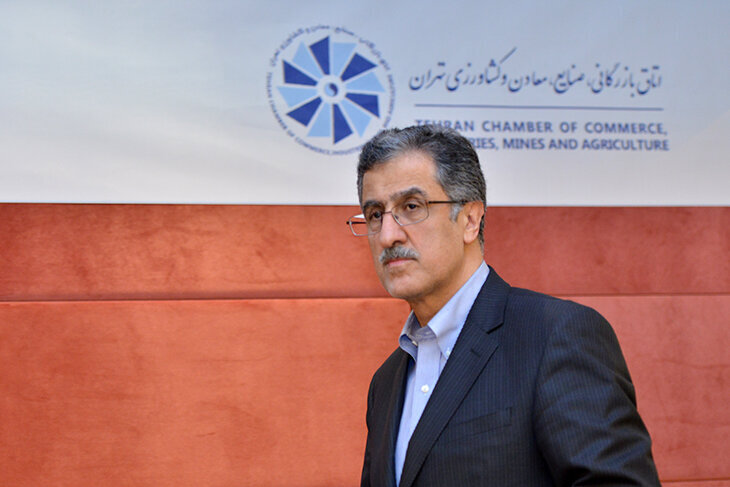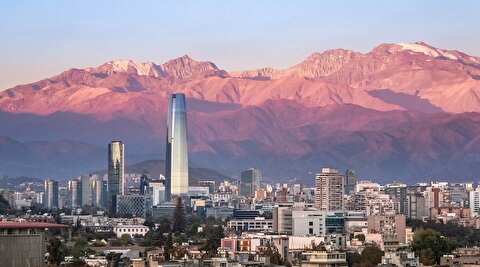
TCCIMA provides suggestions for amending budget bill

As reported by the TCCIMA portal, eliminating subsidies, reducing government funding and eliminating preferential official foreign currency exchange rate were the suggestions that Khansari presented for amending the budget bill in order to be able to withstand the economic pressures imposed by U.S. sanctions.
Speaking in a chamber representatives meeting, Khansari mentioned the possibility of a budget deficit due to the decrease in the country’s oil revenues, saying “We are expecting a budget deficit up to 1.5 quadrillion rials (about $35.8 billion) this year, and there is concern that the government will offset this deficit by borrowing from the central bank, issuing bonds, or increasing taxes on production units.”
The official went on presenting the TCCIMA suggestions for amending the budget bill, noting “Our first suggestion is to reform the subsidies, since every month over 8.9 quadrillion is allocated for subsidies.”
The TCCIMA head further suggested that at least part of such subsides (gasoline and energy subsides) should be eliminated and be paid directly to low-income classes of the society.
As the second suggestion, Khansari pointed to lowering the funding for the state-run companies and noted that the budgets allocated to such companies is almost three times the total budget in the long run, while state-owned companies are usually not that profitable.
“If the government would cut 10 percent of the budget allocated to these companies, many of the budget problems would have been solved,” he added.
The third and final suggestion was to eliminate the preferential official foreign currency exchange rate.
“Unfortunately, such dual rate system, not only has no merits and results in corruption in the country's economy, it also increases smuggling and leads to capital flight,” he said.
Khansari also criticized unnecessary bureaucracy in the customs, saying, “Custom administration data shows that more than four million tons of basic goods are piled up at the customs due to numerous regulations and inconsistencies, and it is necessary to take action in this regard.”
Since the U.S. reimposed sanction on Iran in 2018, the country has been pressing to reduce its dependence on oil sales.
The issue came of the highest importance due to Trump’s decision on cutting all waivers of Iranian oil which would dramatically decrease the country’s oil revenues.
In June, Iran’s Planning and Budget Organization (PBO) published a report titled “Budget Amendment Outline” including 23 major policies, with cutting budget’s direct dependence on oil income as the major approach.
Last week, the government approved the generalities of a modified budget plan which is said to be restructured in line with the country’s “resilient economy”.
As reported, the modifications consisted of four major parts, which were “sustainable revenue resources”, “effective expenditure”, “promoting stability, development and justice” as well as “fundamental modifications of budgetary system”.
The amendments are aimed at reducing the country’s dependence on oil money and promoting economic stability under the umbrella term “resistance economy”, ordered by Supreme Leader of the Islamic Revolution Ayatollah Seyyed Ali Khamenei.


Gold price eases after Trump downplays clash with Fed chair Powell

Copper price hits new record as tariff deadline looms

Brazil producers look to halt pig iron output as US tariff threat crimps demand

Three workers rescued after 60 hours trapped in Canada mine

Gold price could hit $4,000 by year-end, says Fidelity

Chile’s 2025 vote puts mining sector’s future on the line

US targets mine waste to boost local critical minerals supply

Energy Fuels surges to 3-year high as it begins heavy rare earth production

Glencore workers brace for layoffs on looming Mount Isa shutdown

Trump tariff surprise triggers implosion of massive copper trade

Maxus expands land holdings at Quarry antimony project in British Columbia

BHP, Vale accused of ‘cheating’ UK law firm out of $1.7 billion in fees

Southern Copper eyes $10.2B Mexico investment pending talks

American Tungsten gets site remediation plan approved for Ima mine in Idaho

Kinross divests entire 12% stake in Yukon-focused White Gold

Gold price could hit $4,000 by year-end, says Fidelity

Southern Copper expects turmoil from US-China trade war to hit copper

Ramaco Resources secures five year permit for Brook rare earth mine in Wyoming

Column: EU’s pledge for $250 billion of US energy imports is delusional

Trump tariff surprise triggers implosion of massive copper trade

Maxus expands land holdings at Quarry antimony project in British Columbia

BHP, Vale accused of ‘cheating’ UK law firm out of $1.7 billion in fees

Southern Copper eyes $10.2B Mexico investment pending talks

American Tungsten gets site remediation plan approved for Ima mine in Idaho

Kinross divests entire 12% stake in Yukon-focused White Gold

Gold price could hit $4,000 by year-end, says Fidelity

Southern Copper expects turmoil from US-China trade war to hit copper

Ramaco Resources secures five year permit for Brook rare earth mine in Wyoming














